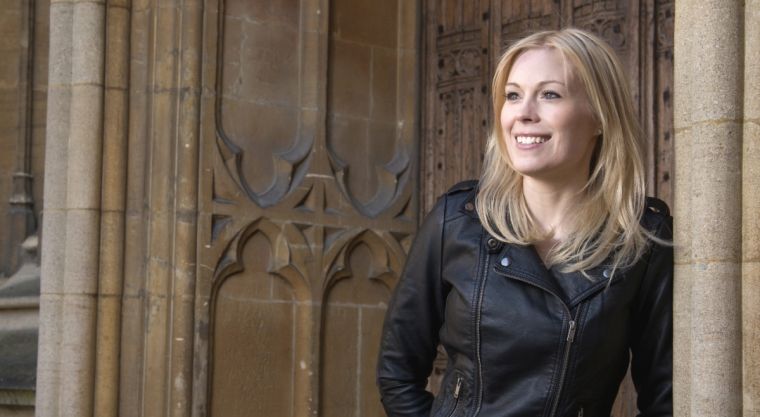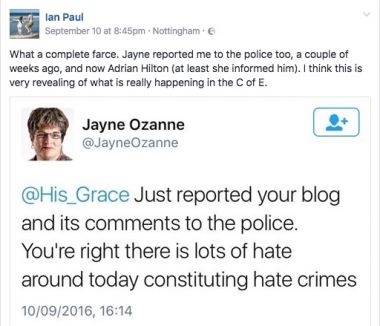Vicky Beeching, Jayne Ozanne and Archbishop Cranmer: What happens when argument turns toxic

When does fair comment become so unfair that it's actually hate speech?
It's a question that's increasingingly being asked because of the speed at which online rows can flare up and go nuclear – and sometimes these rows can be quite revealing of wider agendas.
This happened last week when Vicky Beeching, the most famous "out" lesbian in the evangelical world, wrote an article for the Guardian reflecting on the Bishop of Grantham, Nicholas Chamberlain, who is gay and celibate. It's nice that his sexuality isn't an issue, she says, but the celibacy thing is still a pity: "Thankfully the church is not installing CCTV on bedroom walls to monitor this, but verbal assent is required. The result is a quasi 'don't ask, don't tell' culture generating fear, shame, and secrecy instead of the love and security that should be the right of any couple." Enforced celibacy, she argues, "utterly demeans gay relationships".
In her own case, she says, this policy has led her to decline suggestions from "senior church leaders" that she should become a priest: "For me, as an openly gay Christian who disagrees with enforced celibacy and believes priests should be able to marry, I fear I'd simply be opening myself up to further damage, discrimination, and heartache. It's a lot to weigh up."
Cue a response from the Archbishop Cranmer blog run by Adrian Hilton. Cranmer's piece – anonymous, but presumed to be by Hilton – takes Beeching to task for presuming to make service as a priest conditional, as he sees it, on the Church of England taking a particular line on human sexuality. If you're called, you're called, and you gladly accept the limitations and sacrifices this imposes on you. He rewrites John 15:6: "Ye have not chosen me, but I have chosen you, but not yet: I've chosen you for when the church changes to suit your selfish ends, so just wait a bit."
He compares her unfavourably with the Bishop of Grantham, saying: "Vicky Beeching may consider the harsh rigorism of bodily austerity to be anti-incarnational, but to live Christianly is to die to self; to live and participate in the church community of the centuries, not to chorus the fleeting fanaticism of the present."
However, if Beeching and Cranmer were both waving pieces of plutonium around, it was a comment on Cranmer's post by another gay evangelical, Jayne Ozanne, that slammed them together. She wrote: "Am I the only one to find this particular blog highly offensive and hypocritical?
"Archbishop Cranmer starts by saying 'Please don't attack her personally: she's been through enough' and then goes on to do just that!"
Beeching, she said, was "shining a light on a cruel situation that affects many of us who have a calling to serve God amongst His people, but who are unable to go forward for ordination in the Church of England because of its current stance on LGBTI Christians". Ozanne followed this up by a tweet to Cranmer informing him she had reported him and his blog to the police (after a previous personal abuse and threats and an attack on her house she was given a personal police liaison officer, to whom she sent screen grabs); Cranmer hit back with a blog post attacking her for attacking him and defending his attack on Vicky Beeching, who he said had attacked the Church of England.
@His_Grace Just reported your blog and its comments to the police. You're right there is lots of hate around today constituting hate crimes
— Jayne Ozanne (@JayneOzanne) September 10, 2016
These exchanges were accompanied, in a sort of off-key harmony, by a string of critical comments on blogs and social media. A good number of them were offensive by any standards. Ozanne issued another statement saying while most exchanges on this subject had been "healthy and constructive despite their robustness", "Some material, however, has been deep within the territory of that which is hateful, personal and offensive." She referred to the personal abuse she had experienced herself.
@JayneOzanne Never heard of you until today. You truly are a bizarrely hate-filled woman who needs to repent of her actions.
— Huw Rees (@HuwReesMusic) September 11, 2016
It's far to say there's a great divide between those who regard Cranmer's piece and the comments associated with it as all part of the rough-and-tumble of robust debate, and those who regard it as entirely beyond the pale.

Christian Today contacted Hilton, Beeching and Ozanne for their takes on what happened. Hilton has not yet responded. Beeching said: "As someone who regularly writes for newspapers and takes part in TV and radio debates, it's simply part of the job to expect others to respond with their own differing views. I've had to develop a very thick skin over the past two years, since opening up about the extremely personal topic of being gay.
"However, Cranmer's piece is an example of how the Christianity of LGBT people – of myself and many others – is perpetually demeaned; our motives, purity of heart, and commitment to Christ are doubted and rubbished. We're portrayed as selfish, heretical and counter to Jesus' way of life. Regardless of how used to this I am, from all my writing and broadcasting on the topic, it's still painful – I wouldn't be human otherwise.
"My heart aches for the many people who've written to tell me they face the same problem that I described in my Guardian piece: they are LGBT, feel called to the priesthood, but are scared for their own well-being to enter a church that makes them feel like second class citizens. I'm less bothered about Cranmer calling my own purity of faith into question, and more concerned about the impact his words have on people like them."
For Ozanne too, the point is the personal nature of the attack – not just Cranmer's, but the accompanying comments. She told Christian Today: "The article was very personal, but it was the comments following that really caused the harm.
"It was a personal attack. It was a very ill-considered piece and it was meant to be offensive."
Adrian Hilton, she pointed out, was not an insignificant blogger; his Archbishop Cranmer pieces were frequently mentioned in the Church of England's daily media round-ups and he had been invited to Lambeth Palace. Cranmer, she said, "needed to be called out". He had crossed the line, she said, with an assault on Beeching's integrity.
Who's crossed the line, if anyone?
So who's right? That all depends on the question. And the trouble is that the question has escaped and is loose on social media, enjoying the sort of freedom experienced by an escaped leopard roaming around Dartmoor. Rather than being about how the Church of England deals practically and theologically with differing convictions about human sexuality, it is about how people feel, how they are treated and what it's fair to say about them.
In Cranmer's defence, this is precisely how Beeching framed the Guardian piece to which he took such exception. She refers to the "scars" she carries from when she came out in 2014 and says she'd be "opening myself up to further damage, discrimination, and heartache" if she were to offer herself for pre-ordination training. Well, Cranmer might have said: it's a pity if you feel like that, but those are the rules, and there's plenty of good work you can do as a lay Anglican. Instead, having urged people not to attack her personally, he attacks her personally, casting aspersions on her integrity and accusing her of chorusing the "fleeting fanaticism of the present" and "wailing in the Guardian". And Ozanne's criticisms of the tone of the article – which were about the snide personal jibes rather than its substance, which is not, in fact, entirely unreasonable – were taken by too many otherwise sensible people as an indication that dark forces were attempting to shut down any discussion about human sexuality, on the ground that conservatives were self-evidently deluded if not actually wicked.
There are unquestionably people who believe that, many of them Guardian-readers; and there is an infuriatingly shallow narrative in some quarters that argues that non-celibate gay people should be fully included in the Church's ministry because of "equality" or because we have all moved on and are more civilised than we used to be. But the Church has to be better at theology than that, and most people who engage in this debate actually are.
Among them is the Archbishop of Canterbury, whose comments at this year's Greenbelt should be a continual reference point. He said he was "constantly consumed with horror" at the way in which the Church has treated the gay community, but also that "we have to find a way to love and embrace everyone who loves Jesus Christ" – including those feel – or come from societies which believe – that same-sex relationships are "deeply, deeply wrong".
When people like Vicky Beeching or Jayne Ozanne express their profound hurt at the language used about them, the wisest and most Christian thing for conservatives to do would be to listen to them. But when conservatives point out that while these feelings need to be heard, they simply cannot drive the whole conversation about human sexuality independently of scripture, tradition and reason, they need to be respected as well.
And when the Archbishop of Canterbury says he "can't see the road ahead", it would be very foolish for anyone else to claim they can.
Follow Mark Woods on Twitter: @RevMarkWoods











